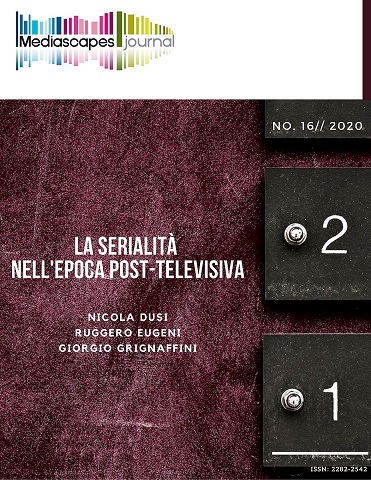Intermediale, transmediale, crossmediale in Westworld
Parole chiave:
TV series, Westworld, video game, loop, routineAbstract
In this essay we will discuss through the lens of Lotman’s “semiosphere” (1984) the media ecosystem (Pescatore, 2018) of the HBO show "Westworld" (Jonathan Nolan and Lisa Joy, 2016 – ongoing). The replicability thematized in it, between loops, repetitions, memorial overlaps, together with the problem of consciousness and empathy which distinguish a human being from a cyborg since P.K. Dick’s science fiction stories, define a constantly translating and reinterpreting fictional universe.
Observing a sequence from the first episode of the first season and the mobile video game linked to the show, we propose a continuum that crosses the "Westworld" semiosphere, intended here as a complex set of relationships – inter-textual and inter-medial, trans-medial and cross-medial – that can be interpreted coherently. In this continuum we see on the one hand the intertextual and intermedial relations that retranslate the fictional universe into an intersemiotic continuity that moves from the 1973 movie “Westworld” (Michael Crichton) and its sequel, continues through the TV show “Beyond Westworld” (Lou Shaw) briefly aired in 1980, and lands in the transmedia continuity on which the HBO show "Westworld" and its promotional paratexts are built. On the other hand we propose to place crossmedia products like video games and fan works on the opposite pole of the continuum, in partial discontinuity with the original fictional world.
We intend intermediality not only as a hybridization of thresholds between media (Rajewsky, 2005), but also as a bridge of continuity and a translation invariance (Dusi, 2015). In these terms, also adaptation, remake, repetition, and variation, are to be considered inter-medial products. Intermediality so becomes one of the poles of an interpretative and transformative process based on mechanisms of translation, to be always considered in their sociocultural context and constraints. On the other pole we will instead have all the cross-medial practices allowed by a strong discontinuity from their sources, as mash-ups and creative reworkings produced by the fans. In the tension between these two poles, in the middle of the semiotic continuum, we will find re-elaborations and transmedial expansions that have a continuity with the reference fictional world (like remixes). In our opinion, this idea broadens Jenkins' distinction between "adaptation" and "extension", the former taking the same narrative from one medium and telling it again in another, and the latter trying to add something to the existing story in its passage from one medium to another (2011). We will therefore talk about intermediality in front of adaptations and remakes, and about transmediality when the original fictional world is extended through inventions and new variants (like sequels, prequels, paraquels), also reaching radical transformations as in the case of cross-media products.


